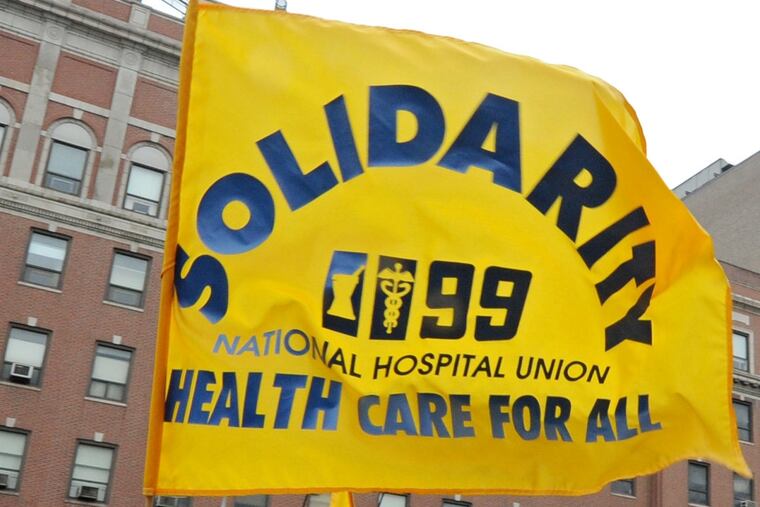100 Black women vote to unionize at Warminster rehab center: ‘We just want to be appreciated’
The workers, who provide care to patients with traumatic brain injuries, voted to unionize with AFSCME District 1199c. It was the health care union’s first election during the pandemic.

The early months of the coronavirus lockdown were tough on the more than 100 aides at Delaware Valley Residential Care.
The aides, Black women making $11 an hour caring for patients with traumatic brain injuries at the residential rehab center in Warminster, struggled with child care as day cares and schools shut down.
Those working the night shift were stuck as SEPTA service slowed. If they missed the last bus back to Philadelphia, which left 15 minutes after their shift ended at 11 p.m., they’d be stranded in the suburbs or have to pay for an Uber.
They were risking their health every day to work during the pandemic. Yet they felt like their employer was barely accommodating them — the people who made the facility run.
“The residential aides get treated like the bottom of the totem pole,” said residential care aide Shakita Shaw. “But it’s because of us that this company is even open.”
Now, as the city eases coronavirus restrictions, the workers are hoping things might change, thanks to a new development: They recently voted to unionize with AFSCME District 1199c, a union that represents 13,000 healthcare service workers.
The successful campaign — run by a predominantly Black union — comes at a time of worker uprisings and Black Lives Matter protests that sometimes intersect. Black lives matter at work, too, organizers have said.
The vote, counted Thursday afternoon by the National Labor Relations Board (NRLB) via Zoom video conference, was 27-1. (In order to win a union election, workers need a majority of those who voted.) About 40 workers cast mail-in ballots, but 10 were voided because they lacked signatures and five were challenged because the employer said those workers were no longer employed at the facility.
Shaw, a 30-year-old single mother of three and a leader of the campaign, said she and her coworkers wanted to unionize because of seemingly arbitrary disciplinary procedures, unequal pay, and a lack of respect on the job.
“We go above and beyond and it seems like they don’t appreciate us,” she said. “We just want to be appreciated.”
In a statement, Delaware Valley Residential Care executive director Mark Morgan said the facility did not oppose the union, a point Shaw confirmed.
“It is a shame someone is misleading the media with false facts ... after 1199c only ‘won’ an election that DVRC did not even oppose with about 25% of the unit voting for the union,” Morgan said in a statement. “Of the more than 100 potential voters, the union had only 27 votes in its favor in this unopposed election.”
Morgan added: “DVRC has a long history of treating its employees generously and fairly, including giving additional pay to employees providing direct care during the pandemic. ... In this setting, the health of DVRC’s direct-care employees and its residents are interrelated and DVRC has been taking all appropriate safety measures.”
The union campaign, which started before the city went into lockdown mid-March and culminated in 1199c’s first new unit amid the coronavirus, reveals a window into the challenges and opportunities for union organizing during a pandemic. As thousands of workers across the region were laid off and others were forced to report to work throughout the early stages of lockdown, workers — both union and nonunion — have organized to fight for safer working conditions, lobby the government for stronger protections, and pressure their employers to change their ways. But much of the pandemic organizing in the region so far has not culminated in unionization.
One hurdle was the mail-in ballot election process due to the coronavirus.
A union election is generally scheduled 30 days after workers file for one with the NLRB. But union elections all over the country were stalled because of the coronavirus, as NLRB officials didn’t think in-person elections could be conducted safely. In this case, it took two months to get to an election. Workers had about five weeks to send in their ballots.
» READ MORE: SEPTA’s ‘lifeline service’ can mean a grueling commute for essential workers
The pandemic created hardships that made workers feel even more like their employer didn’t care about them, Shaw said.
“They were giving, I would say, hell to the people who had children,” she said. “They don’t try to work around your schedule.”
Many of her coworkers — largely Haitian and African American women — are single mothers, she said. Some quit during the pandemic because they couldn’t make it work.
And while the company eventually offered $25 gift cards to those who were willing to carpool with colleagues to work, Shaw said it took too long for that kind of action.
Shaw, who was a member of 1199c at her last job, says the union will help her coworkers get a stronger voice on the job and offer them training opportunities to advance in their field, like certification to become a nursing assistant.